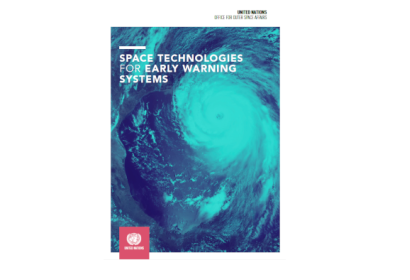UN-SPIDER launched a new publication: “Space-based Technologies for Early Warning Systems” during its currently ongoing conference.
You can access the pdf version of the publication using this link.
This publication, compiled by the UN-SPIDER programme of the United Nations Office for Outer Space Affairs (UNOOSA), presents examples of the use of space-based data, products and services in early warning systems that address hydrometeorological, geological, extraterrestrial, health, biological, environmental and coastal hazards. It presents numerous examples of ways in which the space community and experts in many areas are broadening the spectrum of applications in all areas of effective, people-centred early warning systems.
It serves as a gateway for readers to familiarize themselves with the efforts carried out by many national and regional space agencies, universities, organizations and private companies to improve early warning systems. It includes 81 case studies that provide information on efforts by these institutions and more than 350 links to websites where readers can find additional information on these efforts.
The publication is also intended as a contribution from the Office and its UN-SPIDER programme to the implementation of the Sendai Framework for Disaster Risk Reduction 2015–2030, and to the “Early Warnings for All” initiative launched by the Secretary-General of the United Nations in 2022.
With this publication UN-SPIDER aims to provide advice to Governments and disaster management stakeholders and practitioners on how space technologies can contribute to enhancing the effectiveness of early warning systems. In a complementary fashion, UNOOSA presents this publication as an example of ways in which the space community is bringing the benefits of space to humankind.

